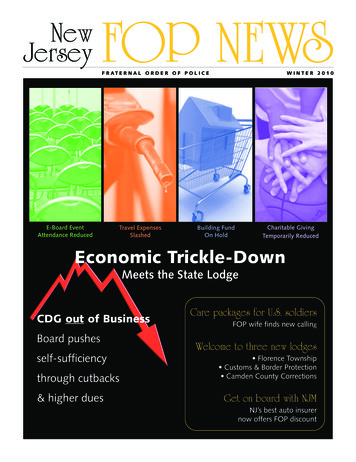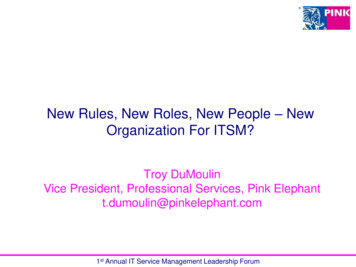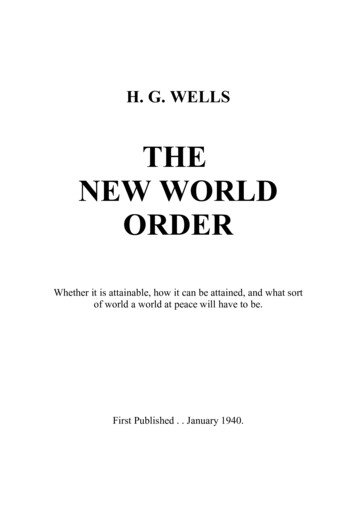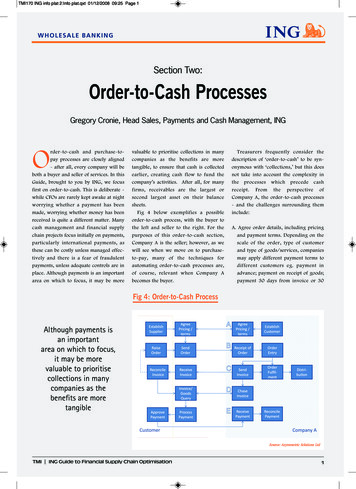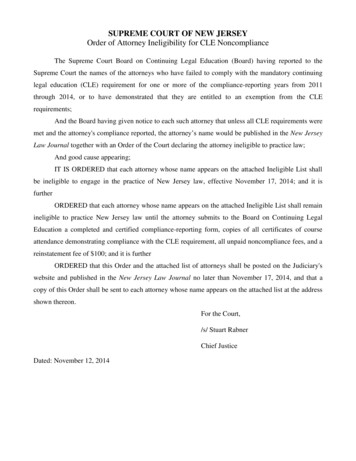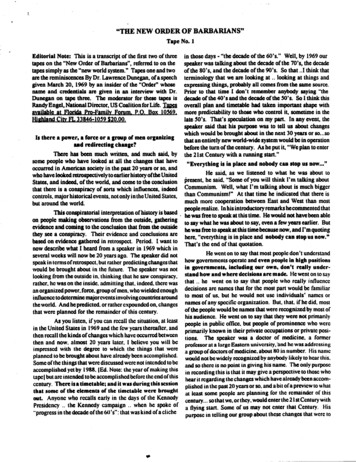
Transcription
"THE NEW ORDER OF BARBARIANS"Tape No. 1Editorial Note: This is a transcript of the first two of threetapes on the "New Order of Barbarians", referred to on thetapes simply as the "new world system ." Tapes one and twoare the reminiscences By Dr. Lawrence Dunegan, of a speechgiven March 20, 1969 by an insider of the "Order" whosename and credentials are given in an interview with Dr .Dunegan on tape three. The moderator for there tapes isRandy Engel, National Director, US Coalition for Life .Available at Florida Pro-Family Forum. P .O . Box 10369,Highland City FL 33846-1039 20 .00 .Is there a power, a force or a group of men organizingand redirecting change?There has been much written, and much said, bysome people who have looked at all the changes that haveoccurred in American society in the past 20 years or so, andwho have looked zed ospectively to earlier history ofthe UnitedStates, and indeed, of the world, and come to the conclusionthat there is a conspiracy of sorts which influences, indeedcontrols, major historical events, not only in the United States,but around the world.This conspiratorial interpretation of history is basedon people making observations from the outside, gatheringevidence and coming to the conclusion that from the outsidethey see a conspiracy. Their evidence and conclusions arebased on evidence gathered in retrospect . Period . I want tonow describe what I heard from a speaker in 1969 which inseveral weeks will now be 20 years ago . The speaker did notspeak in terms of retrospect, but rather predicting changes thatwould be brought about in the future. The speaker was notlooking from the outside in . thinking that he saw conspiracy .rather, he was on the inside, admitting that . indeed, there wasan organized power. force, group of men. who wielded enoughinfluence to determine majorevents involving countries aroundthe world. And he predicted. or rather expounded on, changesthat were planned for the remainder of this century .As you listen, if you can recall the situation, at leastin the United States in 1969 and the few years thereafter, andthen recall the kinds of changes which have occurred betweenthen and now, almost 20 years later, I believe you will beimpressed with the degree to which the things that wereplanned to be brought about have already been accomplished .Some of the things that were discussed were not intended to beaccomplished yet by 1988 . (Ed . Note: the year of making thistapcl but arc intended to be accomplished before the end of thiscentury . There is a timetable ; and it was during this sessionthat some of the elements of the timetable were broughtout. Anyone who recalls early in the days of the KennedyPresidency . . the Kennedy campaign . . when he spoke of"progress in the decade of the 60's" : that was kind of a cliche00in those days - "the decade of the 60's ." Well, by 1969 ourspeaker was talking about the decade of the 70's, the decadeof the 80's, and the decade of the 90's . So that . .1 think thatterminology that we are looking at . . looking at things andexpressing things, probably all comes from the same source .Prior to that time I don't remember anybody saying "thedecade of the 40's and the decade of the 50's. So I think thisoverall plan and timetable had taken important shape withmore predictability to those who control it, sometime in thelate 50's . That's speculation on my part . In any event, thespeaker said that his purpose was to tell us about changeswhich would be brought about in the next 30 years or so . . .sothat an entirely new world-wide system would be in operationbefore the turn of the century . As he put it, "We plan to enterthe 21st Century with a running start .""Everything is in place and nobody can stop us now . ."He said, as we listened to what he was about topresent, he said, "Some of you will think I'm talking aboutCommunism. Well, what I'm talking about is much biggerthan Communism!" At that time he indicated that there ismuch more cooperation between East and West than mostpeople realize. In his introductory remarks hecotumented thathe was free to speak at this time . He would not have been ableto say what he was about to say, even a few years earlier . Buthe was free to speak at this time because now, and I'm quotinghere, "everything is in place and nobody can stop us now ."That's the end of that quotation .He went on to say that most people don't understandhow governments operate and even people In high positionsin governments, including our own, don't really understand how and where decisions are made . He went on to saythat . . he went on to say that people who really influencedecisions are names that for the most part would be familiarto most of us. but he would not use individuals' names ornames of any specific organization . But, that. if he did, mostof the people would be names that were recognized by most ofhis audience . He went on to say that they were not primarilypeople in public office, but people of prominence who wereprimarily known in their private occupations or private positions. The speaker was a doctor of medicine, a formerprofessor at a large Eastern university, and he was addressinga group of doctors of medicine, about 80 in number . His namewould not be widely recognized by anybody likely to hear this .and so there is no point in giving his name . The only purposein recording this is that it may give a perspective to those whohear it regarding the changes which have already been accomplished in the past 20 years or so, and a bit of a preview to whatat least some people arc planning for the remainder of thiscentury. . . so that we, or they, would enter the 21st Century witha flying start . Some of us may not enter that Century . Hispurpose in telling our group about these changes that were to
be brought about was to make it easier for us to adapt to thesechanges . Indeed, as he quite accurately said, "they would bechanges that would be very surprising, and in some waysdifficult for people to accept," and he hoped that we, as sortof his friends, would make the adaptation more easily if weknew somewhat beforehand what to expect ."People will have to get used to change. . ."Somewhere in the introductory remarks he insistedthat nobody have a tape recorder and that nobody take notes,which for a professor was a very remarkable kind of thing toexpect from an audience . Something in his remarks suggestedthat there could be negative repercussions Against him if his. . if it became widely known what he was about to say to . . toour group . . if it became widely known that indeed he hadspilled the beans, so to speak . When I heard first that, I thoughtmaybe that was sort of an ego trip, somebody enhancing hisown importance . But as the revelations unfolded, I began tounderstand why he might have had some concern about nothaving it widely known what was said, although this . .although this was a fairly public forum where he was speaking,(where the) remarks were delivered . But, nonetheless, heasked that no notes betaken . . no tape recording be used :suggesting there might be some personal danger to himself . .if these revelations were widely publicized .Again, as the remarks began to unfold, and saw therather outrageous things that were said . . at that time theycertainly seemed outrageous . . I made it a point to try toremember as much of what he said as I could, and during thesubsequent weeks and months, and years, to connect myrecollections to simple events around me . . both to aid mymemory for the future, in case I wanted to do what I'm doingnow - record this. And also, to try to maintain a perspectiveon what would be developing, if indeed, it followed thepredicted pattern - which it has! At this point, so that I don'tforget to include it later, I'll just include some statements thatwere made from time to time throughout the presentation, . .just having a general bearing on the whole presentation . Oneof the statements was having to do with change . People getused . . the statement was, "Peovle will have to get used to theidea of change, so used to change . that they'llbeexpectingchange. Nothing will bepermanent ." This often came out inthe context of a society of . . where people seemed to have noroots or moorings, but would be passively willing to acceptchange simply because it was all they had ever known .This was sort of in contrast to generations of peopleup until this time where certain things you expected to be, andremain in place as reference points for your life . So changewas to be brought about, change was to be anticipated andexpected, and accepted, no questions asked . Another comment that was made . . from time to time during the presentation . . was . "Peovle are too trusting . People don't ask the rightquestions ." Sometimes, being too trusting was equated withbeing too dumb . But sometimes when . . when he would saythat and say, "People don't ask the right questions ." it wasalmost with a sense of regret- as if he were uneasy with whathe was part of, and wished that people would challenge it andmaybe not be so trusting .The real and the stated goals. . .Another comment that was repeated from time totime, . . this particularly in relation to changing laws andcustoms, . . and specific changes, . . he said, "Everything hastwo purposes . One is the ostensible vurnose which will makeit accevtable to veonle: andsecond . i s the real purpose whichwould further the goals of establishing the new system andhaving it ." Frequently he would say, "There is lust no otherway . There's lust no other wav l"This seemed to comeas a sortof an apology, particularly when . . at the conclusion ofdescribing some particularly offensive changes . For example,the promotion of drug addiction which we'll get into shortly .Population ControlHe was very active with population control groups,the population control movement, and population control wasreally the entry point into specifics following the introduction .He said the population is growing too fast. Numbers ofpeople living at any one time on the plant must be limited orwe will run out of space to live . We will outgrow our foodsupply and we will over-pollute the world with our waste .Permission to have babies. . .People won't be allowed to have babies just becausethey want to or because they are careless. Most families wouldbe limited to two . Some people would be allowed only one, andthe outstanding person or persons might be selected andallowed to have three . But most people would [be] allowed tohave only two babies . That's because the zero populationgrowth [rate] is 2 .1 children per completed family . Sosomething like every 10th family might be allowed the privilege of the third baby .To me, up to this point, the word "population control" primarily connoted limiting the number of babies to beborn . But this remark about what people would be "allowed"and then what followed, made it quite clear that when you hearpopulation control" that means more than just controllingbirths . It means control of every endeavor ofan entire . . of theentire world population ; a much broader meaning to that termthan I had everattached to it before hearing this . As you listenand reflect back on some ofthe things you hear, you will beginto recognize how one aspect dovetails with other aspects interms of controlling human endeavors .Redirecting the purpose of sex Sex without reproduction and reproduction without sexWell, from population control, the natural next stepthen was sex. He said sex must be separated from reproduction. Sex is too pleasurable . and the urges are too strong, toexpect people to give it up . Chemicals in food and in the watersupply to reduce the sex drive are not practical . The strategythen would be not to diminish sex activity, but to increase sexactivity, but in such a way that people won't be having babies .
Contraception universally available to allAnd the first consideration then here was contraception. Contraception would be very strongly encouraged, andit would be connected so closely in people's minds with sex,that they would automatically think contraception when theywere thinking or preparing for sex . And contraception wouldbe made universally available . Nobodywantingcontraceptionwould be . . find that they were unavailable . Contraceptiveswould be displayed much more prominently in drug stores,right up with the cigarettes and chewing gum . Out in the open,rather than hidden under the counter where people would haveto ask for them and maybe be embarrassed. This kind ofopenness was a way of suggesting that contraception . thatcontraceptives are just as much a part of life as any other itemssold in the store. And, contraceptives would be advertised .And, contraceptives would be dispensed in the schools inassociation with sex education)Sex Education as a tool of world governmentThe sex education was to get kids interested early,making the connection between sex and the need for contraception early in their lives, even before they became veryactive . At this point I was recalling sonic of my teachers,particularly in high school and found it totally unbelievable tothink of them agreeing, much less participating in, distributing of contraceptives to students . But, that only reflected mylack of understanding of bow these people operate, That wasbefore the school-based clinic programs got started . Many,many cities in the United States by this time have already setup school-based clinics which are primarily contraception,birth control, population control clinics . The idea then is thatthe connection between sex and contraception introduced andreinforced in school would carry over into marriage . Indeed,if young people when they matured decided to get married,marriage itself would be diminished in importance. Heindicated some recognition that most people probably wouldwant to be married, . but that this certainly would not be anylonger considered to be necessary for sexual activity .Tax funded abortion as population control .No surprise then, that the next item was abortion .And this, now back in 1969, four years before Roe vs . Wade .He said. "Abortion will no longer be a crime ." Abortionwil lbe accepted as normal, and would be paid for by taxes forpeople who could not pay for their own abortions . Contraceptivds would be made available by tax money so that nobodywould have to do without contraceptives . If school sex programs would lead to more pregnancies in children, that wasreally seen as no problem . Parents who think they arc opposedto abortion on moral or religious grounds will change theirminds when it is their own child who is pregnant . So this willhelp overcome opposition to abortion . Before long, only a fewdie-hards will still refuse to see abortion as acceptable, andthey won't matter anymore .Encouraging homosexuality. anything goesHomosexuality also was to be encouraged. "Peoplewill be given permission to be homosexual," that's the wayit was stated . They won't have to hide it . And elderly peoplewill be encouraged to continue to have active sex lives into thevery old ages, just as long as they can . Everyone will be givenpermission to have sex, to enjoy however they want. Anythinggoes. This is the way it was put . And, I remember thinking,"how arrogant for this individual, or whoever he represents,to feel that they can give or withhold permission for people todo thingsl" But that was the terminology that was used . Inthis regard, clothing was mentioned. Clothing styles would bemade more stimulating and provocative. Recall back in 1969was the time of the mini skirt, when those mini-skirts werevery, very high and very revealing . He said, "It is not just theamount ofskinthat isexpressed . exposed that makes clothingsexually seductive, but other, more subtle things are oftensuggestive," . things like movement, and the cut of clothing,and the kind of fabric, the positioning of accessories on theclothing. "If a woman has an attractive body, why should shenot show it?" was one of the statements. There was not detailon what was meant by "provocative clothing," but since thattime if you watched the change in clothing styles, blue jeansare cut in a way that they're more tight-fitting in the crotch .They form wrinkles . Wrinkles are essentially arrows. Lineswhich direct one's vision to certain anatomic areas . And, thiswas around the time of the "burn your bra" activity . Heindicated that a lot of women should not go without a bra . Theyneed a bra to be attractive, so instead of banning bras andburning them, bras would come back . But they would bethinner and softer allowing more natural movement . It wasnot specifically stated. but certainly a very thin bra is muchmore revealing of the nipple and what else is underneath, thanthe heavier bras that were in style up to that time .Technology . Earlier' he said . sex and reproductionwould be separated . You would have sex without reproductionand then technology was reproduction without sex . Thiswould be done in the laboratory . He indicated that already,much, much research was underway about making babies inthe laboratory . There was some elaboration on that, but I don'tremember the details, how much of that technology has cometo my attention since that time . I don't remember- I don'tremember in a way that I can distinguish what was said fromwhat I subsequently have learned as general medical information.Families to diminish in ImportanceFamilies would be limited in size. We alreadyalluded to not being allowed more than two children . Divorcewould be made easier and more prevalent . Most people whomarry will marry more than once . More people will not marry .Unmarried people would stay in hotels and even live together .That would be very common - nobody would even ask question about it . It would be widely accepted as no different frommarried people being together . More women will workoutside the home . More men will be transferred to other cities,and in their jobs, more men would travel . Therefore, it wouldbe harder for families to stay together . This would tend tomake the marriage relationship less stable and therefore, tend
to make people less willing to have babies . And, the extendedfamilies would be smaller, and more remote . Travel would beeasier, less expensive,, for a while, so that people who did haveto travel would feel they could get back to their families, notthat they were abruptly being made remote from their families .But one of the net effects of easier divorce laws combined withthe promotion of travel, and transferring families from onecity to another, was to create instability in the families. Ifboth husband and wife are working and one partner getstransferred the other one may not be easily transferred. So oneeither gives up his or her job and stays behind while the otherleaves, or else gives up the job and risks not finding employment in the new location . Rather a diabolical approach to thiswhole thing!Euthanasia and the "demise pill" . . .Everybody has a right to live only so long . The oldare no longer useful . They become a burden. You should beready to accept death . Most people arc . An arbitrary agelimit could be established . After all, you have a right to onlyso many steak dinners, so many orgasms, and so many goodpleasures in life . And after you have had enough of them andyou're no longer productive, working, and contributing, thenyou should be ready to step aside for the next generation . Somethings that would help people realize that they had lived longenough, he mentioned several of these - I don't rememberthem all - here are a few - use of very pale printing ink on formsthat people . . are necessary to fill out, so that older peoplewouldn't be able to read the pale ink as easily and would needto go to younger people for help . Automobile traffic patterns-there would be more high-speed traffic lanes . . traffic patternsthat would . . that older people with their slower reflexes,would have trouble dealing with and thus, lose sonic of theirindependence .Limiting access to affordable medical care makeseliminating elderly easierA big item . . was elaborated at some length was thecost of medical care Would be made burdensomely high .Medical care would be connected very closely with one's work,but also would be made very, very high i n cost so that it wouldsimply be unavailable to people beyond a certain time . Andunless they had a remarkably rich, supporting family, theywould just have to do without care. And the idea was that ifeverybody says . "Enough! What a burden it is on the young totry to maintain the old people," then the young would becomeagreeable to helping Mom and Dad along the way, providedthis was done humanely and with dignity . And then theexample was - there could be like a nice, farewell party, a realcelebration . Mom and Dad had done a good job . And thenafter the party's over they take the "demise pill ."Planning the control over medicine . .The next topic is Medicine . There would be profound changes in the practice of medicine . Overall, medicinewould be much more tightly controlled . The observation wasmade. "Congress is not going to go along with national healthinsurance. That (in 1969)," he said . "is now, abundantlyevident . But it's not necessary. We have other ways tocontrol health care." These would come about more gradually, but all health care delivery would come under tightcontrol . Medical care would be closely connected to work . Ifyou don't work or can't work, you won't have access tomedical care. The days of hospitals giving away free carewould gradually wind down, to where it was virtually nonexistent . Costs would be forced up so that people won't beable to afford to go without insurance . People pay . . you payfor it, you're entitled to it . It was only subsequently that I beganto realize the extent to which you would not be paying for it .Your medical care would be paid for by others . And thereforeyou would gratefully accept, on bended knee, what was offeredto you as a privilege . Your role being responsible for your owncare would be diminished . As an aside here, this is notsomething that was developed at that time . . I didn't understand it at the timeas an aside, the way this works,everybody's made dependent on insurance . And if you don'thave insurance then you pay directly ; the cost of your care isenormous . The insurance company, however, paying for yourcare, does not pay that same amount . If you are charged, say, 600 for the use of an operating room, the insurance companydoes not pay 600 on your part . They pay 300 or 400 . Andthat differential in billing has the desired effect : It enables theinsurance company to pay for that which you could never payfor. They get a discount that's unavailable to you . When % )usee your bill you're grateful that the insurance company coulddo that . And in this way you are dependent, and virtuallyrequired to have insurance . The whole billing is fraudulent .Anyhow, continuing on now, . . access to hospitalswould be tightly controlled . Identification would be needed toget into the building . The security in and around hospitalswould be established and gradually increased so that nobodywithout identification could get in or move around inside thebuilding . Theft of hospital equipment, things like typewritersand microscopes and so forth would be "allowed" and exaggerated ; reports of it would be exaggerated so that this wouldbe the excuse needed to establish the need for strict security,until people got used to it . And anybody moving about in ahospital would be required to wear an identification badgewith photograph and . . telling why he was there . . employeeor lab technician or visitor or whatever . This is to be broughtin gradually, getting everybgdy used to the idea of identifying themselves - until it was just accepted . This need for IDto move about would start in small ways : hospitals . somebusinesses, but gradually expand to include everybody inall places! It was observed that hospitals can be used toconfine people . . for the treatment of criminals . This did notmean, necessarily, medical treatment . At that . . at that timeI did not know the word "Psycho-Prison" as in the SovietUnion, but, without trying to recall all the details, basically, hewas describing the use of hospitals both for treating the sick .and for confinement of criminals for reasons other than themedical well-beingof the criminal . The definition of criminalwas not given .
Elimination of private doctorsThe image of the doctor would change. No longerwould the . . he be seen as an individual professional in serviceto individual patients . But the doctor would be graduallyrecognized as a highly skilled technician, . . and his job wouldchange . The job is to include things like executions by lethalinjection. The image of the doctor being a powerful, independent person would have to be changed . And he went on to say,"Doctors are making entirely too much money . They shouldadvertise like any other product." Lawyers would be advertising too . Keep in mind, this was an audience of doctors beingaddressed by a doctor. And it was interesting that he wouldmake some rather insulting statements to his audience withoutfear of antagonizing us . The solo practitioner would becomea thing of the past. A few die-hards might try to hold out, butmost doctors would be employed by an institution of one kindor another. Group practice would be encouraged, corporationswould be encouraged, and then once the corporate image ofmedical care . . as this gradually became more and moreacceptable, doctors would more and more become employeesrather than independent contractors. And along with that, ofcourse, unstated but necessary, is the employee serves hisemployer, not his patient . So that's . . we've already seen quitea lot of that in the last 20 years. And apparently more on thehorizon. The term HMO was not used at that time, but as youlook at HMOs you sex this is the way that medical care is beingtaken over since the National Health Insurance approach didnot get through the Congress . A few die-hard doctors may tryto make a go of it, remaining in solo practice, remainingindependent, which, parenthetically, is me . But they wouldsuffer a great loss of income. They'd be able to scrape by,maybe, but never really live comfortably as would those whowere willing to become employees of the system . Ultimately,there would be no room at all for the solo practitioner, after thesystem is entrenched .New difficult to diagnose and untreatable diseases . . .Next heading to talk about is Health & Disease. Hesaid there would be new diseases to appear which had not everbeen seen before. Would be very difficult to diagnose and beuntreatable -at least for along time . No elaboration was madeon this, but I remember, not long after hearing this presentation, when I had a puzzling diagnosis to make . I would bewondering, "is this was what he was talking about? Is this acase of what he was talking about'?" Sonic years later, as AIDSultimately developed, I think AIDS was at least one exampleof what he was talking about . I now think that AIDS probablywas a manufactured disease .Suppressing Cancer cures as a means of populationcontrol. . .Cancer . He said, "We can cure almost every cancerright now. Information is on file in the Rockefeller Institute .if it's ever decided that it should be released . But consider if people stop dying of cancer, how rapidly we would becomeoverpopulated . You may as well die of cancer as somethingelse ." Efforts at cancer treatment would be geared moretoward comfort than toward cure. There was some statementthat ultimately the cancer cures which were being hidden inthe Rockefeller Institute would come to light because independent researchers might bring them out, despite these efforts tosuppress them. But at least for the time being, letting peopledie of cancer was a good thing to do because it would slowdown the problem of overpopulation .Inducing heart attacks as a form of assassinationAnother very interesting thing was heart attacks . Hesaid, "There is now a way to simulate a real heart attack . Itcan be used as a means of assassination ." Only a very skilledpathologist who knew exactly what to look for at an autopsy,could distinguish this from the real thing . I thought that wasa very surprising and shocking thing to hear from thisparticular man at that particular time . This, and the businessof the cancer cure, really still stand out sharply in my memory,because they were so shocking and, at that time, seemed to meout of character .He then went on to talk about nutrition and exercisesort of in the same framework . People would not have to . .people would have to cat right and exercise right to live as longas before. Most won't. This in the connection of nutrition,there was no specific statement that I can recall as to particularnutrients that would be either inadequate or in excess . Inretrospect . I tend to think he meant high salt diets and high fatdiets would predispose toward high blood pressure and premature arteriosclerotic heart disease . And that if people who weretoo dumb or too lazy to exercise as they should then theirdietary . . their circulating fats go up and predispose to disease .And he said something about diet information - about properdiet - would be widely available, but most people, particularlystupid people, who had no right to continue living anyway,they would ignore the advice and just go on and cat what wasconvenient and tasted good . There were some other unpleasant things said about food . I just can't recall what they were .But I do remember of . . having reflections about wanting toplant a garden in the backyard to get around whatever thesecontaminated foods would be . I regret I don't remember thedetails . . the rest of this . . about nutrition and hazardousnutrition .With
tapes on the "New Order of Barbarians", referred to on the tapes simply as the "new world system." Tapes one and two are the reminiscences By Dr. Lawrence Dunegan, of a speech given March 20, 1969 by an insider of the "Order" whose name and credentials are given in an interview with Dr
